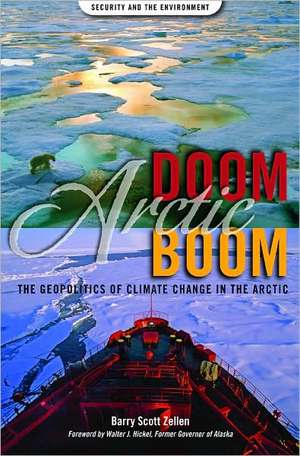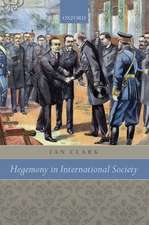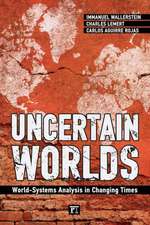Arctic Doom, Arctic Boom: The Geopolitics of Climate Change in the Arctic: Security and the Environment
Autor Dr. Barry Scott Zellen Cuvânt înainte de Walter J. Hickel, Daniel J. Moranen Limba Engleză Hardback – 12 oct 2009 – vârsta până la 17 ani
Preț: 301.64 lei
Preț vechi: 350.68 lei
-14% Nou
Puncte Express: 452
Preț estimativ în valută:
57.72€ • 62.95$ • 48.67£
57.72€ • 62.95$ • 48.67£
Carte tipărită la comandă
Livrare economică 25 aprilie-09 mai
Preluare comenzi: 021 569.72.76
Specificații
ISBN-13: 9780313380129
ISBN-10: 0313380120
Pagini: 248
Ilustrații: 15
Dimensiuni: 156 x 235 x 25 mm
Greutate: 0.52 kg
Editura: Bloomsbury Publishing
Colecția Praeger
Seria Security and the Environment
Locul publicării:New York, United States
ISBN-10: 0313380120
Pagini: 248
Ilustrații: 15
Dimensiuni: 156 x 235 x 25 mm
Greutate: 0.52 kg
Editura: Bloomsbury Publishing
Colecția Praeger
Seria Security and the Environment
Locul publicării:New York, United States
Caracteristici
Includes a lengthy bibliography of resources on the Arctic and its history including materials as current as September 2009
Notă biografică
Barry Scott Zellen is the research director of the Arctic Security Project at the Center for Contemporary Conflict at the U.S. Naval Postgraduate School, where he is also the deputy editor of Strategic Insights.
Recenzii
This book effectively presents a perspective not usually heard in discussions of global warming and the Arctic.
This is a timely and topical book addressing the geopolitical future of the Arctic in a time of dramatic climate change. . . . It will be useful to residents of the north and scientists who work there, policy makers, and businesses with Arctic activities.
Zellen has written a book that will make us think, and for that, his contribution should be lauded and welcomed as a source of important discussion among students and scholars of northern studies and northern policy makers alike.
Timely and intriguing. . Zellen aims high and touches upon a wide range of highly interesting approaches on how to grasp and analyse the challenges and opportunities in the region. One could argue that this leads to a lack of analytical depth, but at the same time this wide scope offers its audience easy access, insight and plenty of food for thought into a wide range of pressing topics within the area of post cold war international relations. The book is a central contribution to the debate on the future of the Arctic.
Zellen deserves credit for providing another perspective on the Arctic's situation where most of the literature is only concerned with the negative impacts of climate change.
The strength of the book lies in its treatment of the surge of activities by the circumpolar states in the 2000s in response to the predicted decline in sea-ice coverage. For example, the need for information on the position of the continental shelf has resulted in the present race by states to map the Arctic oceanbed, in a search for evidence to put before the International Seabed Authority (ISA) under the UN Convention on the Law of the Sea (UNCLOS). This explains the recently updated Arctic policies of Canada and the US, and Russia's dramatic flag-planting escapades at the North Pole in 2007. On these issues the book is commendably up-todate, and we are provided with over 50 pages of endnotes and bibliography (including many websites) for further reference.
The authors challenge some specific perspectives; most notably, yours. Should you be one of the many who don't live in Alaska, the frozen north is just that, and not much else. But for those who reside there, it's their neighborhood, their livelihood, and their home. A scientific look at just where global warming is going to leave us adds a foreboding sense of introspection for more than just those standing on the doorstep of climate change.
This is a timely and topical book addressing the geopolitical future of the Arctic in a time of dramatic climate change. . . . It will be useful to residents of the north and scientists who work there, policy makers, and businesses with Arctic activities.
Zellen has written a book that will make us think, and for that, his contribution should be lauded and welcomed as a source of important discussion among students and scholars of northern studies and northern policy makers alike.
Timely and intriguing. . Zellen aims high and touches upon a wide range of highly interesting approaches on how to grasp and analyse the challenges and opportunities in the region. One could argue that this leads to a lack of analytical depth, but at the same time this wide scope offers its audience easy access, insight and plenty of food for thought into a wide range of pressing topics within the area of post cold war international relations. The book is a central contribution to the debate on the future of the Arctic.
Zellen deserves credit for providing another perspective on the Arctic's situation where most of the literature is only concerned with the negative impacts of climate change.
The strength of the book lies in its treatment of the surge of activities by the circumpolar states in the 2000s in response to the predicted decline in sea-ice coverage. For example, the need for information on the position of the continental shelf has resulted in the present race by states to map the Arctic oceanbed, in a search for evidence to put before the International Seabed Authority (ISA) under the UN Convention on the Law of the Sea (UNCLOS). This explains the recently updated Arctic policies of Canada and the US, and Russia's dramatic flag-planting escapades at the North Pole in 2007. On these issues the book is commendably up-todate, and we are provided with over 50 pages of endnotes and bibliography (including many websites) for further reference.
The authors challenge some specific perspectives; most notably, yours. Should you be one of the many who don't live in Alaska, the frozen north is just that, and not much else. But for those who reside there, it's their neighborhood, their livelihood, and their home. A scientific look at just where global warming is going to leave us adds a foreboding sense of introspection for more than just those standing on the doorstep of climate change.















